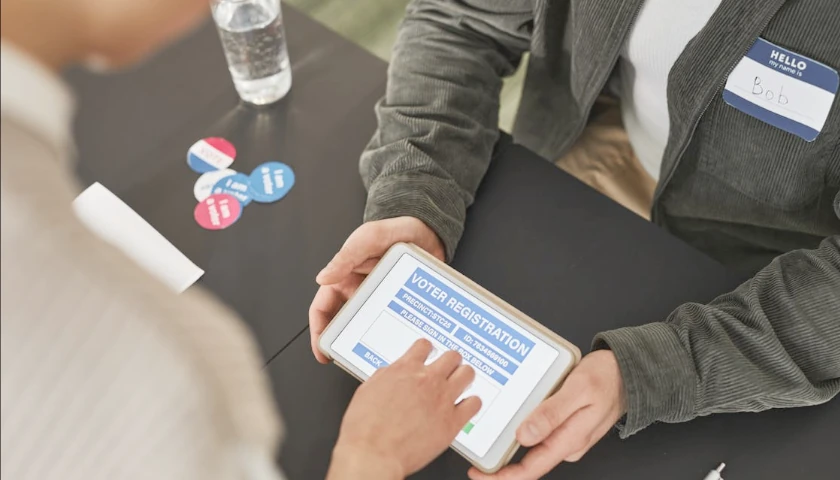by Natalia Mittelstadt
Election-integrity policies are increasing gaining mainstream appeal and acceptance, despite Democrats opposing them under their repeated claim that they are only part of right-wing falsehoods.
From preventing non-citizen voting in U.S. elections to voter ID, Democrats have largely opposed a wide range of election integrity policies that a majority of Americans believe are necessary for the security of elections.
In fact, just five House Democrats voted in favor of a bill passed in the GOP-led chamber Wednesday night to ensure only U.S. citizens vote in federal elections.
The Safeguard American Voter Eligibility (SAVE) Act would amend the 1993 National Voter Registration Act to make states require documentation of a person’s citizenship before registering to vote in federal elections and require states to remove non-citizens from their voter rolls.
While non-citizens are prohibited from voting in federal, state, and most local elections, California, Maryland, Vermont and Washington, D.C., allow them to vote in local elections.
The Biden administration released a policy statement Monday in opposition to the House bill, saying, “The alleged justification for this bill is based on easily disproven falsehoods. Additionally, making a false claim of citizenship or unlawfully voting in an election is punishable by removal from the United States and a permanent bar to admission.
“States already have effective safeguards in place to verify voters’ eligibility and maintain the accuracy of voter rolls.”
Prior to the passage of the SAVE Act, the office of House Minority Whip Katherine Clark, whose duties include recommending how rank-and-file chamber Democrats should vote on bills, released a statement urging colleagues to “VOTE NO” on the SAVE Act.
“As we’ve seen a number of times this Congress, House Republicans continue to irresponsibly call into question the credibility of our elections,” the statement reads. “Despite numerous recounts, challenges in court, and deep-dives by conservative think-tanks, there has been zero evidence of the widespread fraud that this bill purports to target. It is already illegal under current law for non-citizens to register to vote or to vote in federal elections.”
On the social media platform X, Tim Pool, host of the Timcast IRL podcast, reposted Axios’ story on the Democrats opposing the SAVE Act, asking, “What? Why? Who disagrees with this?”
Elon Musk replied to Pool’s post on Sunday, writing, “Because they want to cheat.”
On Friday, Musk reposted previous House Speaker Mike Johnson posts on the SAVE Act, and wrote: “Those who oppose this are traitors. All Caps: TRAITORS. What is the penalty for traitors again?”
Musk has posted support about a number of election integrity issues this week.
He posted on Monday, “When combined with mail-in ballots, the system is *designed* to make it impossible to prove fraud.
“Mail-in and drop box ballots should not be allowed, as cameras on the in-person voting stations would at least prevent large-scale fraud by counting how many people showed up vs ballots cast.”
On Tuesday, Musk wrote, “Electronic voting machines and anything mailed in is too risky. We should mandate paper ballots and in-person voting only.”
Later on Tuesday, he shared a post from the X account “End Wokeness,” which said, “Argentina hand-counted 99.9% of their 27M paper ballots in less than 6 hours. There’s no reason it can’t be done here.”
Musk’s repost said, “This should be a requirement. If Argentina can do it, so can America!”
The billionaire entrepreneur’s election concerns reflect the feelings of a majority of Americans.
According to a Rasmussen Reports poll conducted last month, 66% of likely U.S. voters said that they are worried about the outcome of the 2024 presidential election being influenced by cheating.
The survey was conducted on June 5, 6, and 9, of 1,051 likely U.S. voters, with a margin of sampling error of plus or minus 3 percentage points.
Some of Musk’s opinions regarding election integrity issues also appear similar to those of many Americans.
According to a January Pew Research Center poll, 82% of U.S. adults said they favor requiring electronic voting machines to print paper ballot backups. A total of 81% of survey respondents said that they favor showing government-issued photo identification to vote.
Election integrity policies that nearly half of U.S. adults favored are banning the collection of a large number of completed ballots from voters by groups (47%) and removing voters from registration lists if they haven’t recently voted or confirmed their registration (44%).
The poll was conducted Jan. 16-21 among 5,140 adults. The margin of sampling error is plus or minus 1.7 percentage points.
Voter ID is one of the most popular election integrity policies, and more states have recently implemented the measure.
Currently, according to an analysis by the Movement Advancement Project, 11 states require photo ID to vote and have additional steps that are required if the voter doesn’t have an ID and four states require non-photo ID and have additional steps that are required if the voter doesn’t have an ID.
Over the past year, Georgia, Idaho, New Hampshire, North Carolina, and Ohio faced lawsuits by left-wing groups regarding their voter ID laws.
Legislation like the SAVE Act, which requires only citizens vote in federal elections, would also be popular among American voters.
In a July 2023 poll by the Honest Elections Project, 89% of registered voters believe only Americans should vote in elections. The 89% of voters includes 78% of Hispanic voters, 80% of black voters, and 82% of Democrats.
The poll also found that 89% of voters believe every ballot should be received by Election Day, and 76% believe that voting in person is better than by mail. Regarding ballot harvesting, 74% of voters think it should be illegal.
The poll was conducted July 13-16, 2023, of 1,600 registered voters and has a 2.45% margin of error.
– – –
Natalia Mittelstadt is a reporter for Just the News.






Hand count it is it’s what I expect from our SOS office and our SBE in Georgia. Nothing else will suffice.